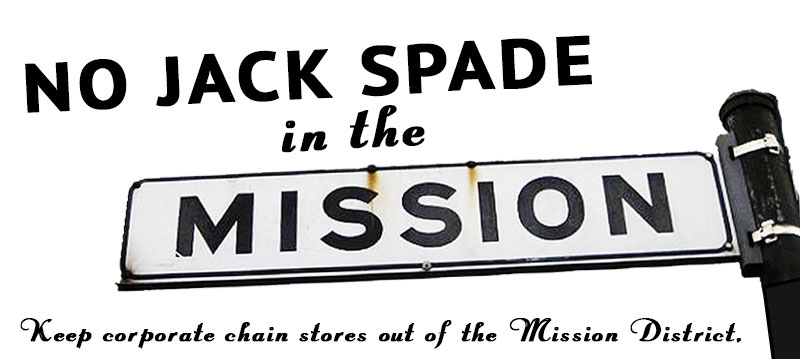The fight to keep suspected formula retailer Jack Spade out of the Mission resumes this evening (Wed/9) when The Stop Jack Spade Coalition lays out it’s case against the men’s clothing chain before the Board of Appeals in an attempt to force the business to go through a conditional use permit hearing. [UPDATE: Activists say they won a big victory last night, not just winning that vote but maybe convincing Jack Spade to withdraw its application completely. We’re working on confirming things now and we’ll have more details soon.]
The new push against Jack Spade comes less than two months after an original appeal found the retailer not to be in violation of the neighborhood’s formula retail ban, with the opposition campaign getting written support of Sups. Eric Mar, John Avalos, and David Campos. They join a growing list of those opposed to the retailer, one that currently features former Board of Supervisors presidents Matt Gonzalez and Aaron Peskin and Assemblymember Tom Ammiano.
If the coalition is granted a rehearing, it will be the second time an appeal is heard on the matter. On Aug. 21, the Board of Appeals ruled against the retailer in a 3-2 majority decision, but the decision still lacked the four votes required to revoke the building permits.
Jack Spade — currently slated to rent the former Adobe Bookshop storefront at 3166 16th Street — was originally granted its business and building permits sans conditional use hearing, an act that was supposed to be unheard of for a prospective national retailer inside a neighborhood with a formula retail ban.
The 2004 formula retail ordinance requires a businesses to get a conditional use permit before moving into certain San Francisco neighborhoods if they meet the “formula retail” criteria. Part of that criteria states that a store can have no more than 11 “retail sales establishments located in the United States.” Jack Spade, pre-Mission store, has just 10 unique stores, which allowed them to circumvent the hearing process.
But according to 5th & Pacific’s public records, the holding company (formerly known as Liz Claiborne) that owns Jack Spade, the high-end men’s clothing store is not an independent business but rather a sub-brand of Kate Spade; a women’s clothing store with 94 locations in the United States alone.
The coalition opposing Jack Spade’s now-imminent Mission migration is using this piece of information as Exhibit A in their fight against the retailer. The coalition is claiming that by not acknowledging the fact that Jack Spade itself was part of a far larger corporation, the retailer violated the formula retail ban by claiming “independent business” status.
As the move-in date for the Mission’s unwanted addition grows near, the coalition has taken up the cause once again, mustering support from nearly every constituency available.
It will be bringing its revamped case to the Board of Appeals, this time with testimony seemingly focused on the misleading nature of Jack Spade’s classification as an “independent business.” That should prove to be an effective move for the coalition, because Jack Spade isn’t an independent business, and they don’t try to classify themselves as such outside of San Francisco.
In fact, according to 5th & Pacific’s 10-K filings with the SEC, the “Kate Spade brand offers fashion accessories for women under the Kate Spade and Kate Spade Saturday trademarks, and for men under the Jack Spade trademark.” The two brands even share the same CEO: Craig Leavitt. Declaring that the two companies are independent of each other based on product offering is like saying beef and milk are independent of other because they come from different parts of the cow.
Now, armed with an updated defense, the Coalition is taking a second stab at the appellate process, one they feel good about. In a letter to the Board, executive director of the Valencia Corridor Merchant Association (VCMA) Luis Granados said, “If the findings section were fully taken into account [last time], we believe the Board will see that Jack Spade is formula retail, as set forth under the law.”
Or as Gonzalez wrote in a letter to the Board of Appeals: “Issues of corporate ownership and/or corporate structure have been a matter of debate in previous hearings regarding Jack/Kate Spade’s permits. While nowhere in the planning code does it require the consideration of corporate ownership/structure, neither does the ordinance forbid a consideration of corporate ownership/structure. Indeed, in order to fulfill the clear intent of the law in a common sense manner, it will be necessary, in some cases, to consider corporate ownership/structure.
I urge you to grant the VCMA’s request for a rehearing of Jack/Kate Spade’s permits in order to prevent manifest injustice.”
And considering the momentum that the anti-Jack Spade movement is now gaining, the optimism isn’t unreasonable.
Activist Andy Blue, who helped organize the protest, acknowledged the high bar needed to overrule the flawed ruling by the Planning Department, telling us, “We’re cautiously optimistic, but it’s a long shot.”

